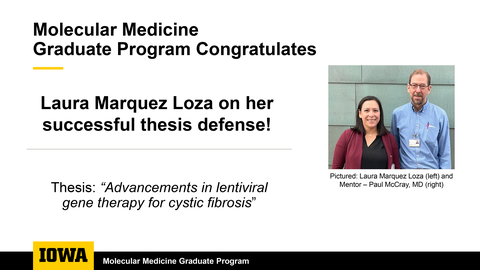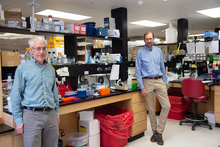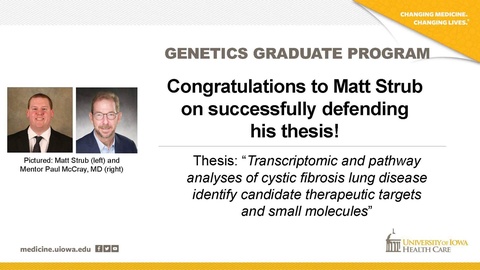Breadcrumb
- Home
- News
News
Emily's Entourage: Paul McCray, Jr., MD, Announced as Recipient of Emily’s Entourage 2024 Trailblazer Award
The award recognizes Dr. McCray for his pioneering work in gene therapies and dedication to the final 10% of the cystic fibrosis community who do not benefit from current CFTR modulators.
NHLBI News: A cystic fibrosis cure for all? Gene editing shows promise
Paul McCray, M.D., professor of pediatrics, and microbiology and immunology at the University of Iowa and his collaborator, David Liu, Ph.D., at the Broad Institute, have been working on newer version of gene editing technologies. One known as prime editing allows any letter in the genetic code to be replaced, even sections of the code as long as a couple hundred letters.
Carver College of Medicine News: McCray wins Distinguished Alumni Award for Achievement
The Distinguished Alumni Award is the highest honor the University of Iowa Roy J. and Lucille A. Carver College of Medicine bestows upon its outstanding graduates. The Award for Achievement honors alumni for significant professional accomplishments in science, medicine, and/or education.
Broad Institute (MIT) News: Prime editing efficiently corrects cystic fibrosis mutation in human lung cells
Researchers at the Broad Institute of MIT and Harvard and the University of Iowa have developed a gene-editing approach that efficiently corrects the most common mutation that causes cystic fibrosis, found in 85 percent of patients. With further development, it could pave the way for treatments that are administered only once and have fewer side effects.
Emily’s Entourage Awards $858,932 in Inaugural Collaborative Research Grant for Novel Approach to Targeted Airway Delivery in Cystic Fibrosis Treatments, May 2024
Carver College of Medicine News: Rare lung cells reveal another surprise with implications for cystic fibrosis
A new study by University of Iowa researchers finds that rare lung cells known as pulmonary ionocytes facilitate the absorption of water and salt from the airway surface. This function is exactly the opposite of what was expected of these cells and may have implications for cystic fibrosis (CF) lung disease.
Carver College of Medicine News: Drug protects older mice from worst effects of COVID-19
An experimental drug that counters immune aging, effectively prevents death in older mice with severe COVID-19, suggesting it may have potential as a therapy to protect older people who are most at risk from the disease. The new findings by researchers with University of Iowa Health Care were published recently in the journal Nature.
Carver College of Medicine News: Inhaled COVID-19 vaccine prevents disease and transmission in animals
In a new study assessing the potential of a single-dose, intranasal COVID-19 vaccine, a team from the University of Iowa and the University of Georgia found that the vaccine fully protects mice against lethal COVID-19 infection. The vaccine also blocks animal-to-animal transmission of the virus. The findings were published July 2 in the journal Science Advances.
A spritz instead of a jab? Future COVID-19 vaccines may go up your nose (National Geographic, 7/27/21)
Congratulations, Laura!

Carver College of Medicine News: Repurposed mouse model sheds light on loss of smell in COVID-19
A repurposed mouse model can develop symptoms of both severe COVID-19 (lung damage, blood clots, abnormal blood vessels, and death) and also of milder disease, including loss of the sense of smell, according to a new University of Iowa study published in Nature. When COVID-19 started spreading across the world earlier this year, UI researchers Stanley Perlman, MD, PhD, and Paul McCray, MD, realized that a mouse model they had created a decade earlier to study SARS might be an invaluable tool for understanding the concerning new disease and for testing potential treatments. In the new study, Perlman, McCray, and colleagues present a detailed characterization of the effects of SARS-CoV-2 infection in these K18-hACE2 mice.
Carver College of Medicine News: McCray Lab & UI cystic fibrosis research team receive $11.5 million NIH grant to develop new therapies
A team of cystic fibrosis experts with University of Iowa Health Care has been awarded a five-year, $11.5 million grant by the National Heart, Lung, and Blood Institute to research molecular therapies for cystic fibrosis (CF) lung disease. “The overall goal of this program project grant is to better understand the cellular basis of CF airway disease and use this knowledge to direct new therapies towards its prevention or treatment,” says Paul McCray, MD, principal investigator of the grant and a professor in the UI Stead Family Department of Pediatrics, and the Department of Microbiology and Immunology in the UI Carver College of Medicine.
Gene therapy could offer an inclusive cure for cystic fibrosis (Nature, July 29, 2020)
Scientists have been trying for 30 years to wield gene therapy against cystic fibrosis. In past efforts, the viruses that they engineered to deliver the working copy of the gene into cells didn’t work effectively. Now, thanks to better vectors and other innovations in delivering genetic sequences, gene-replacement therapies are nearing clinical trials, and the field is gaining momentum.
This article highlights the contributions that investigators at the University of Iowa have made and continue to make to advance gene therapy for CF.
Carver College of Medicine News: Off-the-shelf tool for making mouse models of COVID-19

A major hurdle to developing and testing new anti-viral therapies and vaccines for COVID-19 is the lack of good, widely available animal models of the disease. Researchers at the University of Iowa Carver College of Medicine and Medical University, Guangzhou, in China, have developed a simple tool to overcome that bottleneck. The researchers have created a gene therapy approach that can convert any lab mouse into one that can be infected with SARS-CoV-2 and develops COVID-like lung disease. The international team, led by Paul McCray, MD, and Stanley Perlman, PhD, at the UI, and Jincun Zhao, PhD, at Medical University, Guangzhou, have made their gene therapy vector freely available to any researchers who want to use it.
Congratulations, Matt!
